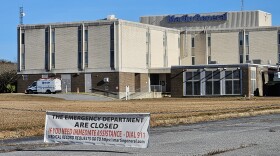Durham-based orthopedic surgeon Dr. Richard Mather was an early adopter of telehealth services. He says he has long believed it can help patients and improve health care. That experience proved beneficial over the past two years.
"I've had patients tell me they feel even more personal in the video visit because, well for one, we don't wear masks," he says. "They'll say, 'That's the first time I've seen your face.' So I actually think that the video visit enabled a level of personalization that in-person encounters we still don't have."
Mather says virtual conferences also make it easier to perform other patient-doctor tasks, like reviewing for an upcoming surgery.
"The ability to share an MRI and go through it [is] really nice," he says. "The convenience is tremendous."
In 2020, private health insurers and government payers like Medicare started approving basically every telehealth bill. The thinking was that even if there was some fraud, the benefit of telemedicine during a pandemic outweighed those concerns. Doctors knew there would be some guardrails on telemedicine after the worst of the pandemic, they just didn't know how tight.
For health insurers, continuing to pay for telehealth made sense. John Smith is the medical director for Blue Cross and Blue Shield of North Carolina, the state's largest private health insurer.
"We do want to ensure quality," he says. "And certainly that's the responsibility — and it's a shared responsibility across the health care community."
To the pleasant surprise of providers, Blue Cross recently announced it would still cover 97% of the services that it covered under its emergency policy. In health care, it's a rare day when providers and payers see eye to eye like this. Smith says the insurer even took doctor feedback into consideration when making the new policy.
Boon for rural health care, with hurdles
Rural providers saw major benefits as patients now didn't have to drive long distances just to see the doctor. Stephanie Wroten, the chief operating officer of Roanoke-Chowan Community Health Center, hopes these payment approvals continue.
"That's one of the things that we're hoping we don't regress on," she says. "In terms of why make all these spectacular, and I call them spectacular movements forward, to ensure folks have accessible health care that spans beyond brick and mortar."
But, she points out that getting paid is only part of the equation.
"In eastern North Carolina, one of the barriers continues to be broadband. And so it's great to have access to telehealth, but you also need access to the internet."
That's a problem for many in rural North Carolina, including Robin White, who grew up in Gates County in the northeast corner of the state and doesn't have internet at home.
"It's not worth it," she says.
Even where internet access is technically available, White says it's too expensive.
"Not only that, in this area, you have a lot of people that are older. So it's hard for them to even use their phones," she says. "Once they figure out how to use their phones to actually use telehealth, and it keeps going in and out, in and out, and they're thinking it's their problem, and it's not. It's just the internet service, or the service period."
In some ways, the benefits that telehealth services would provide are out of reach to those who could benefit most. Sharon Gatling lives in a mobile home in the northern part of Gates County. Her back pain is sometimes so severe that she can't sleep. Although she wants to go to the doctor, she's missed appointments because she can't afford the gas for the 50-mile round trip. She's a patient who could benefit from telehealth services, but she can't afford internet.
"I want to move so bad, but this is what I'm stuck with for right now," she says.
This problem is one that the Biden Administration has tackled. Part of the massive infrastructure bill announced in May includes a $45 billion Internet For All initiative that aims to bring high-speed internet to everyone in the nation by the end of the decade. In the short run, the Affordable Connectivity Program finalized just this month offers a $30-per-month subsidy to offset the costs of high-speed broadband.

Maggie Sauer, who directs rural health for the N.C. Department of Health and Human Services, says improving internet access will bring benefits beyond just telemedicine.
"When we talk about the social determinants of health, and how people can gain health, housing, transportation, food, and all those things, education and employment are incredibly important to that. And we know that sometimes people can gain employment and jobs if they have access to broadband," she says. "So we really look at that, I think, as a health issue."
Even as access barriers remain, advocates for telemedicine say providers should improve their offerings so that people with reliable internet can benefit. Blue Cross saw telehealth services increase by a whopping 7,500% during the pandemic. While uptake will surely decline from that high point, nearly everyone in health care agrees usage will increase going forward.







